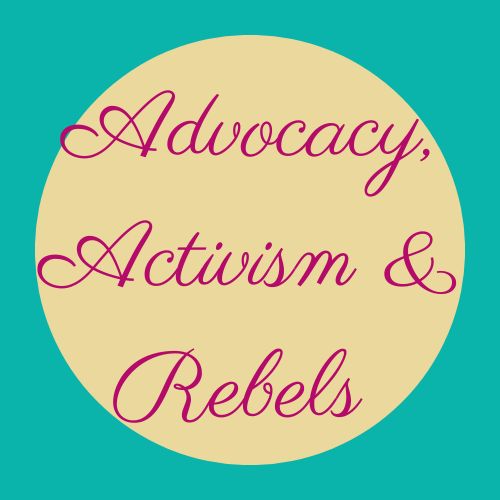
A few days ago I saw this post in the LinkedIn Group Mental Health Change Agents-Advocates-Motivational Speakers. If you can’t read it, the gist is: what makes a person difficult? The differences and similarities between rebels, advocates and activists. The Author, Karen Molander, asked the following questions:
- Do you consider yourself a “difficult person”?
- Do you consider yourself a rebel?
- Do you think rebels are difficult people? Or are rebels just people who are fighting for a cause?
- Is that different than being difficult to deal with?
- What about advocates… and activists? Are they difficult people?

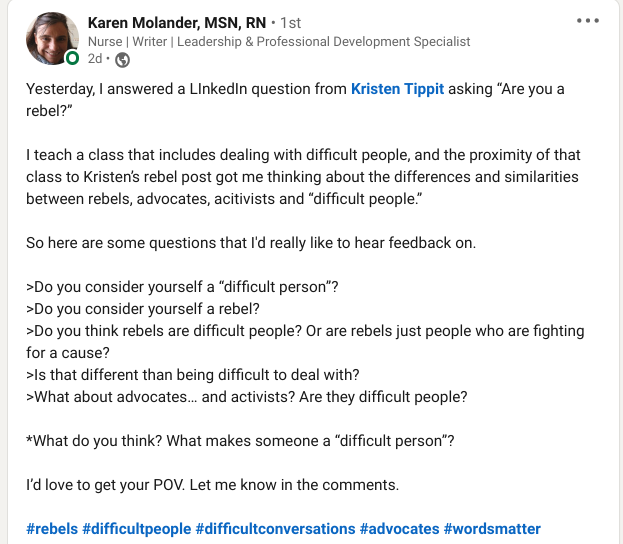
I didn’t have to think for a minute. This is what I replied:
“I am difficult. I’m not a rebel, but I’m pro civil disobedience…
Rebels are not difficult people. Just canaries in coal mines
Yes, there is a difference. Most people who find me difficult to deal with take what I say personally. Whereas others who don’t, find me assertive, eloquent and reasonable.
Same goes for advocates and activists. Often people find the form too difficult, or the subject too difficult, and then decide that the PERSON is difficult, rather than deal with the message.
In my opinion closed minded people are difficult. I think difficult is in the eye (or ear) of the beholder.
I do enjoy being a devil’s advocate – by that time I’m trying to be difficult on purpose though!
Thanks for this post 🙏
Added:
I know most of the people who know me find the people I choose to work or socialize with VERY difficult. They find it difficult to understand how I don’t find them difficult to work with or socialize with.
Even those ‘difficult’ people find it difficult to accept that I work or socialize with who THEY find difficult. And I have no problems with it until anyone tells me they find ME difficult for choosing differently. 😂 Can anyone follow this? Or is it too difficult 👀”
Back to basics – definition of difficult, advocacy, activism and rebel
When I answered Karen’s post, I didn’t need to think of the definitions of each. English has always been a favorite subject of mine. To the extent where it has become my first language, despite Dutch officially being my mother tongue.
Here in Aruba, and in most parts of the world, English is a second language. Which usually means that people can communicate well in their second language, and understand things reasonably, but the nuances and details of things are not inherent.
That often leads to difficulty: they are convinced they’re fluent in a language, but once you start conversing, it turns out that basic definitions may be there, but the nuances that is the difference between a first, a second language or native language, are missing.
So on to the definitions, according to the Cambridge Dictionary:
Difficult
- needing skill or effort;
- not friendly, easy to deal with, or behaving well;
- not easy or simple; hard to do or to understand;
- Difficult also means having problems;
- A person who is difficult is not easy to deal with.
Advocacy
- public support of an idea, plan, or way of doing something;
- the work of defending people in court.
Activism
- the use of direct and noticeable action to achieve a result, usually a political or social one;
- the use of direct and public methods to try to bring about esp. social and political changes that you and others want.
Rebel
- a person who is opposed to the political system in their country and tries to change it using force;
- a person who does not like rules or authority, and shows this by behaving differently from most people in society.
A brief interlude about the difficulty of my English
For those of you who know me and are wondering ‘Why Cambridge? You speak like an American!’ here’s something you probably don’t know.
I started speaking and understanding English at an early age. My grandmother was Welsh. My early years were spent in Aruba, where a lot of people speak American or Caribbean English. My mother and grandmother read to me in English, or encouraged me to read in English, mostly classic ‘children’s’ books by mostly English writers.
When I was eight I started studying English as a Second Language for school requirements. Prior to entrances exams for the Hong Kong International School. The methods used were to prepare me for the First Certificate and Proficiency exams of Cambridge University. The latter of which I successfully passed when I was 14.
So yes, I speak like an American. And sometimes I use creole-English or British vocabulary. Yes, at one point I decided to use American spelling and grammar. I was required to make that choice at school. But I was initially instructed in British English. And I’m a certified native speaker through Cambridge. When it comes to definitions and concepts, I’m very much British. Even if I’m very American when it comes to analyzing definitions and concepts. And very Caribbean when it comes to certain day-to-day interactions.
Kinda difficult? Not to me.
Why the differences and similarities between being difficult, advocacy, activism and rebels matter
Why is it important to know the differences and similarities? Because in life, as in most things, definitions do matter. Words do matter. Communication is an essential part of human nature. And yet it causes incredible problems because people assume that the other persons has a basic understanding of the definitions, and a basic understanding of the concepts behind those definitions.
And when someone who is at the receiving end of those assumptions doesn’t stop and say
‘Wait, let’s take a step back and see if we’re talking about the same things or mean the same things’
you can get Babylonian situations.
What’s a Babylonian situation?
The person on the receiving end might feel like their lack of understanding makes them seem stupid. And they react defensively. The person who assumes their definitions and concepts are clear, might find that reaction unprofessional or unwarranted, and then decide that the person across from them is difficult. And that person then decides that the first person is difficult, because they don’t understand their, in their eyes, perfectly normal reaction.
I have watched this happen on a daily basis. And I’m confronted with this on a daily basis. In countries, work environments or social circles that share basic norms and languages, it still happens often. In countries such as Aruba, where:
- we have 4 spoken languages
- most people are not fluent in any of them when it comes to reading, writing or listening comprehension
- most people are not one ethnicity
- do not come from one cultural background
- do not have similar norms when it comes to their home life, school life, work life or social circle
it’s exponentially more obvious.
Awareness matters
But AWARENESS of this is limited. Let stand that these difficult differences are taken into consideration. So we, as a society, are riddled with conflict or conflict avoidance because we don’t stop to ask: ‘are we arguing or fighting over the subject, or are we arguing and fighting because we’re actually discussing different things? Do our basic definitions and concepts align?’
That’s difficult versus you’re difficult
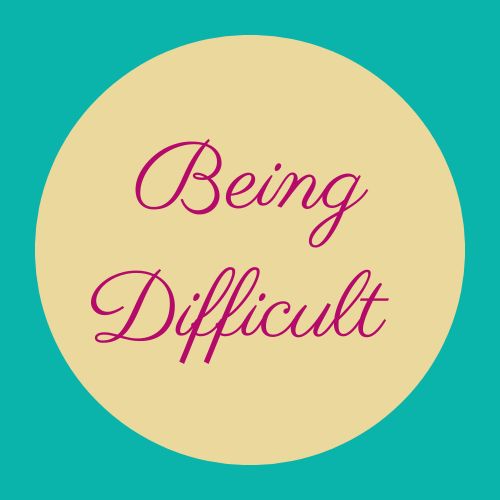
This is a difficult (not easy or simple; hard to do or to understand) subject matter, and most people I know will find it difficult (needing skill or effort) to understand. A lot of those people will find that their difficulty with the subject or difficulty understanding, is much easier explained if they re-frame the difficulty. I, as the author, am a person who is difficult (hard to understand, not easy to deal with). There for I am difficult (not friendly, easy to deal with, or behaving well). Which somehow translates to me having difficulties (having problems).
Oddly enough almost everyone I know has the same problem. They’re just not really aware of how these different aspects of ‘being difficult’ actually affect them or cause them to behave in unconscious ways.
I am difficult
Wait, that’s a bad thing! You shouldn’t say that!
I disagree. I am objectively difficult, because my past is complex and my disease is complex. I come from a complex family with multiple ethnicity and cultures. I grew up in a lot of different countries, learned a lot of different languages, and was faced with a lot of stress and traumas, both acute and chronic, which most people never have to face.
On top of that:
- I speak a lot of languages well – that means most people assume that I am fluent in whichever language I am speaking in
- I am perfectly capable of respecting the established norms and values of groups – that means that most people assume I share those same norms and values
- I speak about difficult concepts and problems easily – that means that most people assume I also know how to deal with difficult concepts and problems, or should be responsible for the difficult concepts or problems
Plus I don’t behave, or think, or act, the same in all situations. Especially considering my complex trauma history this is not strange at all. In triggering, stressful or traumatic situations that have effect on my person, I can sometimes revert back to unhealthy defense mechanisms or coping mechanisms.
But when my mental health is good, I am very capable of coping with stress or trauma.
And in my professional life, when I am faced with stressful situations, complex problems or difficult concepts that have nothing to do with me personally, I am actually very good at dealing with these things.
To me these differences are normal; to others it is difficult to understand that one person can, in situations they would find stressful or traumatic, act efficiently and proficiently. Yet in situations they find perfectly normal, un-traumatic or don’t consider stressful at all, I can react incredibly viscerally and immature.
The difficulty surrounding advocacy, activism and rebels
The biggest difficulty surrounding advocacy, activism and rebels is the glaringly obvious similarity. In all cases there is a problem. Not just an issue that affects this one person, but something that is structurally wrong, unfair or even illegal, and yet accepted by society and the powers that be.
That in itself is a difficult concept: advocates, activists and rebels all are aware of injustice or inequality. But their point of view is a minority point of view. The greater part of society or the powers that be either are not affected by the injustice or inequality, or may even profit from the injustice or inequality.
That means that to society or the powers that be advocates, activists and rebels are inherently difficult. Because they challenge things such as:
- the way things have always been done
- cultural taboos
- laws and regulations
- mob mentality
- out-dated concepts and ideas
- social, economic and judicial injustice or inequality
Wait, how can the similarity be the difficulty?
I do love a good juxtaposition. Similarity is a problem when people assume that similarity means that they are the same. Advocacy, activism and rebels are similar. But advocacy does not equal activism, nor are all advocates or activists rebels.
So the difficulty with the similarity between advocacy, activism and rebels is
- Because advocates, activists and rebels challenge similar things, the different ways in which they challenge, are often lost in the scuffle
- Because advocates, activists and rebels choose different ways in which to challenge society and the powers that be, they often lose sight of the fact that their way, is not the ONLY way
- Because society loves categorizing people, concepts and things, fitting everything into neat little boxes and labels, people who are both advocates and activists, or maybe even rebels to boot, just can’t exist to the majority of society. And in some cases even to themselves.
Advocacy
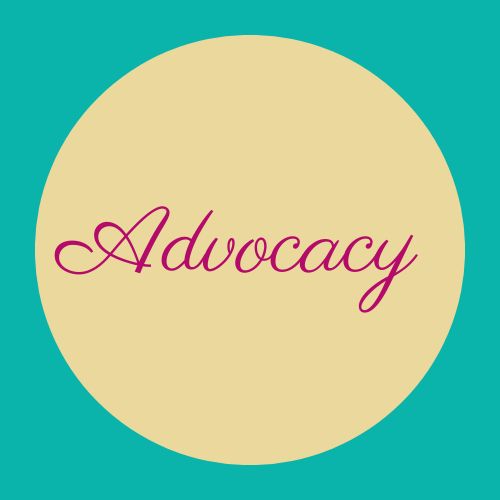
Just a reminder, the definition of advocacy is:
- public support of an idea, plan, or way of doing something;
- the work of defending people in court.
That’s pretty simple. Politicians advocate. Lawyers advocate. Advocates advocate. The problem lies in the SUBJECT they advocate for. Not in the advocacy itself.
When a lawyer defends someone we don’t like, or defends an ideal or basic right for a person we don’t agree with, very few people are able to distinguish between the fact that the lawyer is doing his or her job and the fact that we don’t think that what or who we disagree with, deserves the same rights as us.
The lawyers are advocating for their client. They’re advocating for equality in the eyes of the law. They’re advocating for not being discriminated against because the opposing party doesn’t like the person or their ideas. They’re advocating that all human rights, all basic rights, should be respected. Not only apply to those whose points of view we agree with.
*Gasp* ‘The audacity! Laws and regulations should protect the good people, the minorities, the majority, those who are deserving!’
That’s another discussion for another time, but most definitely why advocacy is sometimes seen as difficult.
I am an advocate
I founded the Jeffry Stijn Foundation (i.o) for Mental Health and Patient Advocacy recently. Advocacy is a core tenant.
But even prior to this I have been an advocate in a lot of different aspects of my life.
Being an advocate is inherent to my personality.
Being an advocate has been a huge part of my education and career.
I studied law throughout my life. Starting when I was a young teenager, through THIMUN and the UN‘s Declaration of Human Rights. With a specialization through the Model International Court of Justice. Followed by Dutch Law in Leiden. Added onto my legal knowledge by studying Management, Economics and Law in The Hague. Moved to an apartment with a view of the Peace Palace in the Hague. Studied Aruban Law at the University of Aruba. Worked for an Aruban law office, and managed an Aruban trust office. And finally became a certified compliance officer.
To this day I still follow courses that have to do with law and justice, and I read and listen to podcasts about law and justice whenever I can.
Being an advocate was stimulated in school. In international schools debate is a necessary skill. Writing essays to defend your point of view is par for the course. Being able to defend them verbally, is part of how you are graded.
That I never finished a law degree is a blessing in hind-sight. I think I would have made a terrible lawyer. I probably would have burned out completely. But I am, and always have been, and always will be an advocate. My knowledge of the law is an incredible asset in that.
But I don’t need a degree to be an effective advocate. Plus it makes me happy.
Activism
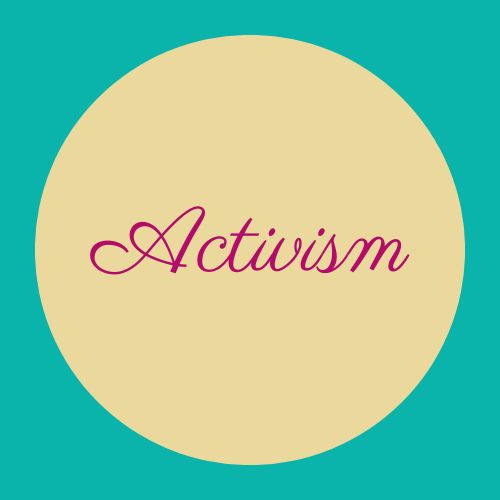
Let’s start with the definition of activism again:
- the use of direct and noticeable action to achieve a result, usually a political or social one;
- the use of direct and public methods to try to bring about esp. social and political changes that you and others want.
Where advocacy supports change, promotes change or defends against change, activism means taking action in order to effect change. Examples of activism are:
- writing letters to newspapers or publishing op-eds
- sending in complaints
- proposing new laws, rules or regulations
- protesting
- boycotting
- physically blocking access to buildings or areas
- arranging a sit in
- civil disobedience
- speaking out
- printing flyers that explain why you’re for or against something
There’s tons of examples of activism.
The difficulty with activism is that a lot of people don’t like the form of activism. E.g. how, when and where you decide to protest. And then your message doesn’t even come across. You might be advocating for something good, those people who don’t like your form of activism might even agree with your stance, but your advocacy is lost because people find it to difficult to accept certain basic concepts such as:
Especially because when you make use of these freedoms or rights, people feel like their rights and freedoms are somehow limited.
Let me try and make that clear through examples.
Freedom of Association
The freedom of association also means you are free NOT to associate with people you don’t like, agree with, etc. Nobody is forcing you to associate with anyone. That you choose to do so because you are afraid of the repercussions if you don’t, is completely separate from your right to associate or NOT associate with whom you wish. When you are acting as a private person.
If you are acting as an official for an organization or a government, you are NOT FREE to NOT ASSOCIATE with people you don’t like or agree with, etc. You have a duty and a responsibility that supersedes your personal preferences or rights.
Don’t like it? Not a problem. As long as you do your job to the best of your ability anyways. Decide that because you’re in a position of power that not liking it means you don’t have to do your job? Well, that’s just unethical. If not immoral and illegal.
The Right to Protest
Everyone has the right to protest. In democratic societies that is a given. In certain societies it is a cultural norm. Protesting is a way of life. In other societies, which are undemocratic such as dictatorships, protesting may be illegal, and have incredible consequences such as the loss of freedom or even your life.
But just because you have the right to protest, doesn’t mean you have the right to do anything illegal, no matter how frustrated you are. Yes you have the right to protest, no you don’t have the right to vandalize, harm, or even stop people from entering their homes or places of employment by force. Making the latter difficult or uncomfortable, is not illegal.
That the person whose life is now difficult or uncomfortable because you are protesting may have the power to make your life difficult and uncomfortable in return, is not illegal. Hey guess what? If you have the right to protest so do they!
But they are not allowed to do anything illegal in their protest either. E.g. government officials who use police officers to intimidate protesters in order to try and make the protest stop – you’re abusing your power. The police are not there for your personal use.
A boss who fires an employee because they protest – guess what. That’s illegal too. Just because someone works for you, doesn’t mean you own them, their ideas or can stop them from protecting themselves from harm you as an employer are causing. That in places like Aruba this is not enforced, but individual employees must resort to the judicial system is not right, but an unfortunate reality.
Your right to protest does not mean that you have a right to be free from the social, economic and political consequences of your protest.
Freedom of Speech
And the same goes for the freedom of speech. You are free to spout the most utter nonsense, whenever and wherever you want mostly. If it’s a smart idea is besides the point. Like with the right to protest, your freedom of speech does not mean you have the right to be free from the consequences of your speech.
If someone doesn’t like your speech, they don’t have to listen to it. Or they are free to use THEIR freedom of speech to counter yours. What they don’t have the right to do, nor do you have the right, is to make you shut up. If you don’t like what someone has to say, you are free to walk away.
Again, this is if you are acting as a private citizen. IF you’re acting as the representative of an organization or the government…do I need to repeat it?
YOUR DUTY IS NOT TO ACT LIKE YOU’RE A PRIVATE CITIZEN. YOUR DUTY IS TO DO YOUR JOB.
That’s right. You’re freedom of speech is limited if you’re not acting as a private citizen. Why? It’s super complex, but at the same time it’s kind of simple.
Your job is to answer questions, provide information, comply to laws and regulations. That it’s inconvenient or tiring or that you take what is said or asked of you as a personal affront is besides the point. If you can’t separate your private beliefs from your duties as an official, just means you might not be the right person for the job.
Examples are:
Not answering private citizens or your employees questions because you don’t know the answer, don’t like the answer, don’t like the question, realize the answer to the question might mean there is something structurally wrong with your organization, realize that answering the questions might make you or your organization liable in some way.
Not following rules, regulations or even laws because you don’t like the person or because you DO like the person, is just plain wrong. If not illegal. You are free to do so in your private life, and suffer the consequences, but not in an official capacity. How is this part of freedom of speech? Speech is not just the spoken or written word – actions can be a form of speech too. Just like art or cartoons or, well pretty any form of expression.
I am an activist
Besides being an advocate I am also an activist. I don’t go around joining marches or boycotts. Mostly because my hyper-vigilance gets in the way. I don’t spur on others to follow my lead. I don’t chain myself to fences or go on hungry strikes. But I am an activist none-the-less.
- I ask and answer difficult questions
- I send in letters of complaint
- I practice and am a huge proponent of civil disobedience
- I associate with other activists
- I write about a variety of subjects, both as an advocate and activist
- I frequently use my freedoms and rights in ways others don’t agree with
Rebels
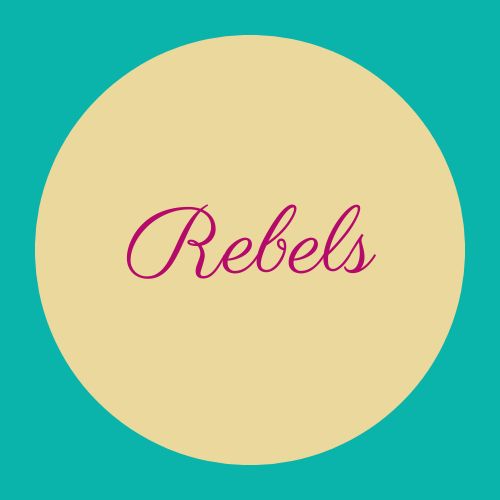
Let’s start with the definition of rebels:
- a person who is opposed to the political system in their country and tries to change it using force;
- a person who does not like rules or authority, and shows this by behaving differently from most people in society.
So how are rebels different from advocates and activists? They inherently choose to take a position outside of the established norms and protocols, AND act from there.
They choose to try and affect change through force, or by choosing to ignore rules or authority. Not necessarily because the rules or authority is wrong, or the political system is objectively unjust, just because they feel it is, and feel they have the right to act accordingly.
But, but, but….you’re an advocate! You embody the law! You should be against rebels!
Are you kidding me? I adore rebels in most cases. At least where they don’t cross over into illegal actions that affect private citizens.
A lot of my friends are rebels. I’ve even dated a few rebels. Not because I’m attracted to ‘bad boys’, but because I admire people who are able to not just defend their particular point of view, but live and breathe their choices. They are unapologetic, act from feeling rather than ration, and tend to have an incredible moral compass, even if to the outside world that doesn’t seem so.
As I stated earlier, to me rebels are the canaries in the coal mines. They are the alarm system that warns of impending danger in society. That their manner is not mine, nor socially or politically accepted by society in general, does not mean that what they are warning us about is not VALID.
I am an-atypical rebel
I initially stated that I’m not a rebel. I still believe that is true. I can’t see myself using force to affect change. I am inherently a proponent of democracy. When it comes to politics I don’t follow established norms, but I don’t expect society as a whole to follow my values just because…um? I can’t even follow that line of reasoning.
I don’t inherently dislike authority or rules. I’m actually quite fond of them. As long as they are JUST. When they’re not just, I don’t go about changing my dress or behavior, or throwing eggs or shoes at people. I just choose to live differently than the accepted norms.
I’ve rebelled against the taboo that is placed on mental illness by speaking openly and honestly about my illness from the get go.
I’ve rebelled against rules or authority by refusing to obey orders when they are unfair, unjust, or even illegal. I’ve done this in all facets and stages of my life, sometimes with detrimental effects.
I do refuse to conform to certain societal norms. But I don’t expect others to follow those, nor do I expect society as whole to adopt those norms. But if my norms and rights, or others’ norms and rights are disrespected, I can be incredibly rebellious.
I am Difficult, an Advocate, an Activist and a Rebel. What about you?
So what do you think? How do you feel? Can you answer Karen’s initial questions too?
- Do you consider yourself a “difficult person”?
- Do you consider yourself a rebel?
- Do you think rebels are difficult people? Or are rebels just people who are fighting for a cause?
- Is that different than being difficult to deal with?
- What about advocates… and activists? Are they difficult people?
And here are two questions of my own:
- Did reading about my point of view change how you look at yourself?
- Does it change how you look at others?


